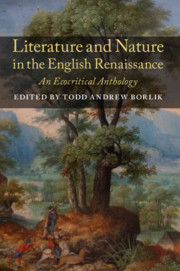Book contents
- Frontmatter
- Contents
- List of Illustrations
- Acknowledgements
- Editorial Principles: Towards the Ecocritical Editing of Renaissance Texts
- Introduction
- PART I Cosmologies
- PART II The Tangled Chain
- PART III Time and Place
- PART IV Interactions
- Animal-Baiting
- Hunting, Hawking
- Fishing
- Pet-Keeping
- Cooking, Feasting, Fasting, Healing
- PART V Environmental Problems in Early Modern England
- PART VI Disaster and Resilience in the Little Ice Age
- Appendix A Industrialization and Environmental Legislation in the Early Anthropocene: A Timeline
- Appendix B Further Reading: A Bibliography of Environmental Scholarship on the English Renaissance
Pet-Keeping
from PART IV - Interactions
Published online by Cambridge University Press: 05 June 2019
- Frontmatter
- Contents
- List of Illustrations
- Acknowledgements
- Editorial Principles: Towards the Ecocritical Editing of Renaissance Texts
- Introduction
- PART I Cosmologies
- PART II The Tangled Chain
- PART III Time and Place
- PART IV Interactions
- Animal-Baiting
- Hunting, Hawking
- Fishing
- Pet-Keeping
- Cooking, Feasting, Fasting, Healing
- PART V Environmental Problems in Early Modern England
- PART VI Disaster and Resilience in the Little Ice Age
- Appendix A Industrialization and Environmental Legislation in the Early Anthropocene: A Timeline
- Appendix B Further Reading: A Bibliography of Environmental Scholarship on the English Renaissance
Summary
The historian Keith Thomas observes that it was “in the sixteenth and seventeenth centuries that pets seemed to have really established themselves as normal features of the middle-class household” (110). In early modern England a wide range of species could be (1) permitted inside the house, (2) given names, or (3) spared from the butcher's knife. The poet Robert Herrick had a spaniel, a cat, a sparrow, a lamb, and even a pet pig (to whom he gave sips of beer), while some kept tame falcons, monkeys, or deer (see Skelton's “Philip Sparrow,” c. 1505, and Marvell's “Nymph Complaining of the Death of her Fawn,” c. 1649). Then as now, pet-keeping could reflect cultural attitudes about class and gender. Whereas Tudor men were encouraged to raise large dogs for hunting or herding, it became increasingly common for city-dwelling gentlewomen to lavish affection on lapdogs. Rather than praise this attachment to a “companion species” (Haraway), Caius growls his disapproval of such attitudes as symptomatic of feminine frivolity. Caius's treatise would later be incorporated wholesale into Topsell's History of Four-Footed Beasts, and was favourite reading of King James, who was once accused of loving his dogs better than his subjects, and whose grandson would have a spaniel breed named after him. Shakespeare knew this book, too, as Kent assumes the alias Caius when he shows a dog-like fidelity to Lear.
Source: Of English Dogs, trans. Abraham Fleming (1576), 20–1.
These dogs are little, pretty, proper, and fine, and sought for to satisfy the delicateness of dainty dames, and wanton women's wills, instruments of folly for them to play and dally withal, to trifle away the treasure of time, to withdraw their minds from more commendable exercises, and [21] to content their corrupted concupiscences with vain disport (a silly shift to shun irksome idleness). These puppies the smaller they be, the more pleasure they provoke, as more meet playfellows for mincing mistresses to bear in their bosoms, to keep company withal in their chambers, to succour with sleep in bed, and nourish with meat at board, to lay in their laps, and lick their lips as they ride in their wagons.
- Type
- Chapter
- Information
- Literature and Nature in the English RenaissanceAn Ecocritical Anthology, pp. 363 - 368Publisher: Cambridge University PressPrint publication year: 2019



